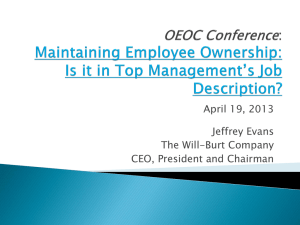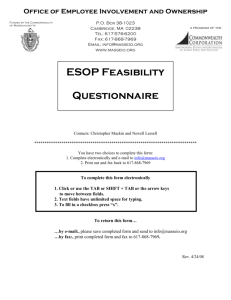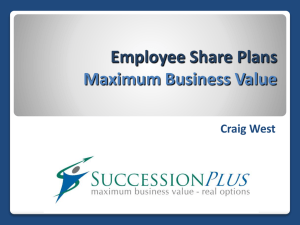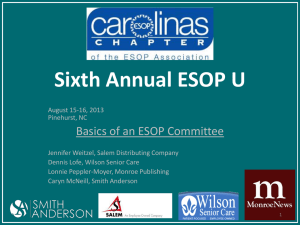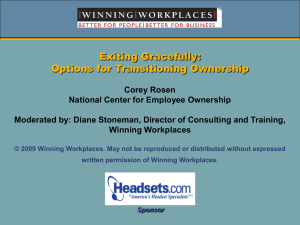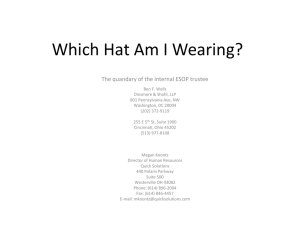Ohio Employee Ownership Center - Kent State University Main Page
advertisement
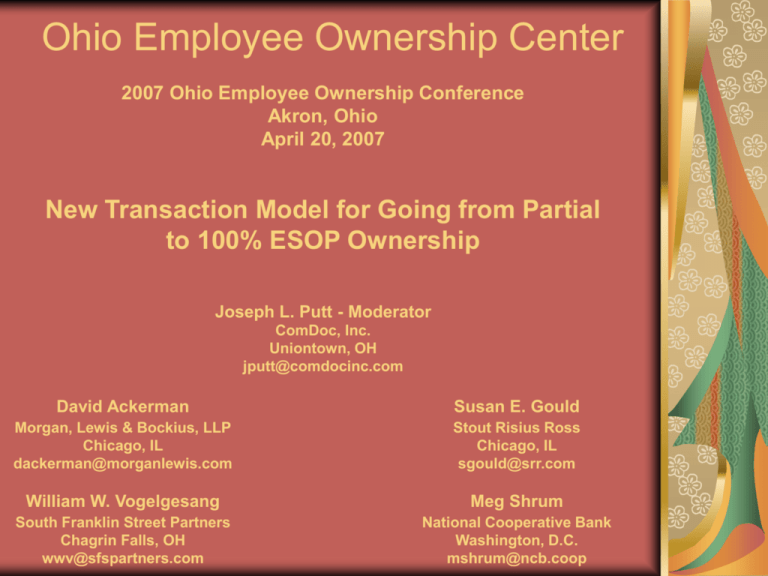
Ohio Employee Ownership Center 2007 Ohio Employee Ownership Conference Akron, Ohio April 20, 2007 New Transaction Model for Going from Partial to 100% ESOP Ownership Joseph L. Putt - Moderator ComDoc, Inc. Uniontown, OH jputt@comdocinc.com David Ackerman Susan E. Gould Morgan, Lewis & Bockius, LLP Chicago, IL dackerman@morganlewis.com Stout Risius Ross Chicago, IL sgould@srr.com William W. Vogelgesang Meg Shrum South Franklin Street Partners Chagrin Falls, OH wwv@sfspartners.com National Cooperative Bank Washington, D.C. mshrum@ncb.coop SCOPE OF PRESENTATION Transaction Structuring Banker’s Role Role of Valuation Advisor Equity Investor’s Role PLANNING OBJECTIVES Liquidity Maximize Price 100% ESOP-Owned S Corp. PLANNING OBJECTIVES: WHY GO TO 100% ESOP OWNERSHIP? Assumption 50% ESOP $10 Million Income Income Tax Distribution Retained Earnings C Corp S Corp $10,000 3,500 0 $ 6,500 $10,000 0 3,500 $ 6,500 TRANSACTION STRUCTURING: REDEMPTION vs. ESOP STOCK PURCHASE Tax Treatment for Sellers Creditors’ Rights HR Considerations Equity Incentives for Management Fiduciary Considerations TRANSACTION STRUCTURING: TAX TREATMENT FOR SELLERS 1042? Installment Reporting TRANSACTION STRUCTURING: CREDITORS’ RIGHTS Seller Financing? Note from ESOP Note from Company TRANSACTION STRUCTURING: HUMAN RESOURCE CONSIDERATIONS ESOP Purchase Leverage impact on current ESOP participants Loan terms Redemption: shares to future employees Changing terms and length of inside loan Reshuffling Internal market ESOP purchase of treasury shares TRANSACTION STRUCTURING: EQUITY INCENTIVES FOR MANAGEMENT Synthetic Equity Planning Considerations IRC §409(p) One Class of Stock Tax Treatment IRC §409A FIDUCIARY CONSIDERATIONS Buyout Price Access to Employee 401(k) Funds Other Fairness Issues Rates of return to ESOP and warrant holders Dilution to ESOP Executive compensation ESOP Administration IRC §409(p) Repurchase liability Solvency Analysis BANKER’S ROLE: GENERAL Financing Alternatives Underwriting and Covenants BANKER’S ROLE: FINANCING ALTERNATIVES Senior Debt Subordinated Debt Seller Financing Employee Funds Equity BANKER’S ROLE: SOURCES OF FINANCING Banks Other Financial Institutions Private Equity Funds BANKER’S ROLE: UNDERWRITING Three plus years of financial statements Look at cash flows historically and projected for adequate consolidated debt service coverage Add backs Collateral coverage must be adequate Post-ESOP management team: seller staying on, others stepping up, new management hired? Special accounting treatment BANKER’S ROLE: EVALUATING FINANCING ALTERNATIVES: COSTS Interest Rate Fees & Expenses Prepayment Penalties Field Exams & Appraisals Reporting BANKER’S ROLE: EVALUATING FINANCING ALTERNATIVES: FLEXIBILITY & CONSTRAINTS Affirmative Covenants Negative Covenants Financial Covenants Amortization Acquisitions ROLE OF EQUITY INVESTOR: GENERAL Sources of Equity Current Market Conditions ROLE OF EQUITY INVESTOR: SOURCES OF EQUITY Institutional Management Employees Other ROLE OF EQUITY INVESTOR: CURRENT MARKET CONDITIONS Attractive Transaction Structures Attractive Valuations Attractive Financing interest rates leverage multiples coverage ratios ROLE OF EQUITY INVESTOR: TAX-PLANNING OPPORTUNITIES Dividend Tax Rate Capital Gains Tax Rate ROLE OF EQUITY INVESTOR: RETURNS ANALYSIS & REQUIREMENTS Pricing Board Representation / Control Exit Rights ROLE OF VALUATION/FINANCIAL ADVISOR: GENERAL Adequate Consideration Fairness Solvency ROLE OF FINANCIAL ADVISOR: ADEQUATE CONSIDERATION/FAIRNESS Adequate Consideration – “that the ESOP is not paying more than fair market value for the stock” Adequate Consideration Standard Not Applicable ESOP not a party to transaction Fair Market Value standard still relevant to: Trustee Board of Directors Management Selling Shareholders ROLE OF FINANCIAL ADVISOR: ADEQUATE CONSIDERATION/FAIRNESS Fairness Analysis Financial fairness analysis Price paid (in the range of fair market value) Relative fairness (compare treatment of different shareholders), cash vs noncash All other elements of transaction – – – – – Management equity incentives Indemnification/Escrow terms Noncompete/Mgmt contract buyouts Financing Terms Does not include non-financial elements (loss of jobs, reduced benefits, etc). ROLE OF FINANCIAL ADVISOR: OPINIONS Need for Separate Advisor Board of Directors – Concerns – fraudulent conveyance, prudence, solvency, independence Structuring Advisor (Investment Bank) Negotiates all parts of deal Solvency Opinion From Investment Bank or Independent Advisor ROLE OF FINANCIAL ADVISOR: OPINIONS Need for Separate Advisor ESOP Trustee – Concerns –prudence, solvency, “act in best interests of participants” Financial Advisor to Trustee May participate in negotiations – particularly with regards to terms of financing – Financial covenants – Mezzanine or seller debt » Warrants, implied rate of return, default provisions, board seats Fairness Opinion The transaction, in its entirety, is fair to the ESOP from a financial point of view ROLE OF FINANCIAL ADVISOR: SOLVENCY Need for Solvency Opinion Standards for Determining Solvency ROLE OF FINANCIAL ADVISOR: SOLVENCY Solvency Opinion – 3 PART OPINION … it is our Opinion as of the date of this letter that, assuming that the Transaction is consummated as proposed, both before and immediately after giving effect thereto: on a pro forma basis, the fair value and present fair saleable value of the Company’s assets exceeds the Company’s stated liabilities, including identified contingent liabilities; the Company will be able to pay its debts as they become absolute and mature; and the capital remaining in the Company after the Transaction is not unreasonably small for the business in which the Company is engaged, as management has indicated it is now conducted and is proposed to be conducted following the consummation of the Transaction. ROLE OF FINANCIAL ADVISOR: SOLVENCY “assuming that the Transaction is consummated as proposed” means all analysis is conducted ‘proforma’ to include all the effects of the transaction All new debt components All new contingent claims (warrants, equity incentive plans, etc.) ROLE OF FINANCIAL ADVISOR: SOLVENCY “the fair value of the assets exceeds the liabilities” Fair market value of assets = fair market value of the enterprise Value of assets must support or exceed liabilities, including debt to fund purchase price ROLE OF FINANCIAL ADVISOR: SOLVENCY “the company will be able to pay its debts as they become due” Based on projections Projected free cash flow must be able to show coverage of required interest and principal payments, as well as all other claims on business Projected free cash flow takes into consideration required capital expenditures and working capital TEST projections for reasonableness/sensitivity ROLE OF FINANCIAL ADVISOR: SOLVENCY “the company will have adequate capital” Appropriate working capital available post-close of transaction for management to manage the business Revolver/line of credit availability Joseph L. Putt Vice President Finance & Planning ComDoc, Inc. Joe is a Berkeley, California native. He is a Corporate Officer and Vice President - Finance & Planning of ComDoc, Inc. He joined ComDoc in 1999 and previously held the positions of Controller and Director - Finance & Planning. In his present position, Joe is responsible for ComDoc’s leasing programs, strategic planning, financial reporting, tax compliance, treasury operations, purchasing, accounts receivable, accounts payable & payroll. . Joe is active in the community. He is a graduate of Leadership Akron’s 2001-2002 class and a member of The University of Akron’s Financial Advisory Board. He served from 2001-2006 as a board member and treasurer of Project: LEARN of Summit County. Joe is active in numerous youth baseball programs. He is an honorary board member of Big Brothers & Big Sisters of Summit County. Joe graduated from Akron - Kenmore High School in 1977. He attended The University of Akron and graduated with a BSBA in Finance (1981) and MBA in Finance (1988). As an undergraduate, he graduated summa cum laude and received the Financial Executive Institute’s Award as the outstanding finance student his senior year. Joe received his CPA designation from the State of Ohio in 1985. He is a member of the American Institute of CPA’s and the Ohio Society of CPA’s. He serves on De Lage Landen’s Dealer Advisory Council, a leading leasing provider within the copier industry. Joe is also a member of Ricoh's Dealer Administration Council Prior to joining ComDoc, Joe was Vice President - Finance of Simon Ladder Towers, Inc. in Ephrata, Pa. (1991-1999), Vice President - Finance, Eagle Plastics, Inc. in Stow, Ohio (1986-1991) and CPA/Manager, Moore-Stephens-Apple CPA’s in Akron, Ohio (1981-1986). Joe enjoys golf, motorcycling, bicycling, softball, and travel. He and his wife, Denise, reside in Hartville with their 17 year-old son, Jonathan. Joe, Denise and Jon attend the Chapel in Marlboro. Other family members include their purebred German Shepherd, Gator, and cat, Boomerang. David Ackerman Morgan, Lewis & Bockius 77 West Wacker Drive Chicago, IL 60601 Phone: 312.324.1170 Fax: 312.324.1001 Email: dackerman@morganlewis.com Education: Harvard Law School, 1974, JD Princeton University, 1971, AB David Ackerman is a partner in the Employee Benefits and Executive Compensation Practice of Morgan, Lewis & Bockius LLP, a national law firm with over 1,250 lawyers in 22 offices. Mr. Ackerman co-chairs the Morgan Lewis ESOP team, which is one of the largest ESOP law practices in the country. Mr. Ackerman is one of the most knowledgeable ESOP lawyers in the nation, having advised hundreds of corporations and their shareholders and directors regarding the use of ESOPs in a wide variety of transactions, including leveraged buy-outs, corporate stock repurchases, ownership succession transactions, and corporate reorganizations. He also regularly serves as legal counsel to ESOP trustees and lenders. Mr. Ackerman is the immediate-past Chair of The ESOP Association’s Advisory Committee Chairs’ Council and is a past Chair of The ESOP Association’s Legislative and Regulatory Advisory Committee. He also has served on the Board of Directors of The ESOP Association Mr. Ackerman has lectured and written extensively on the subject of ESOPs. He is the author of over 20 published articles regarding ESOPs; and he speaks regularly at the annual national conferences of The ESOP Association and of the National Center for Employee Ownership and at their local and regional conferences. Mr. Ackerman has also made presentations regarding ESOPs at numerous other seminars, including programs sponsored by the American Institute of Certified Public Accountants and the American Society of Pension Actuaries; continuing legal education programs of several states, including Illinois, Minnesota and Kentucky; and programs sponsored by the Illinois, Ohio, Michigan, and Heart of America chapters of The ESOP Association, the Ohio Employee Ownership Center, the Chicago Bar Association, the Illinois CPA Society, and many banks and other financial institutions. Meg Shrum Senior Vice President National Cooperative Bank 2011 Crystal Drive Suite 800 Arlington, VA 22202 Phone: 703.302.1943 Fax: 703.647.4207 Email: mshrum@ncb.coop Meg Shrum is a Senior Vice President and relationship manager with the National Cooperative Bank headquartered in Washington DC. She joined NCB in 2000 and serves as Team Leader for the bank’s ESOP lending group which focuses exclusively on providing specialized financing for ESOP transactions nation-wide. Prior to joining NCB, Meg was a Managing Director with Riggs National Bank’s Domestic Private Banking Division in Washington DC, and was previously with Security Pacific Bank in Las Vegas, NV. She received an MBA from the University of Arizona in entrepreneurship in 1987 and is a native of North Carolina. William W. Vogelgesang South Franklin Street Partners 10 ½ E. Washington St. Chagrin Falls, OH 44022 Phone: 440-264-8005 Fax: 440-247-3060 Email: wwv@sfspartners.com Education: Master of Business Administration, 1981, The Ohio State University. Bachelor of Science Cum Laude, 1979, The Ohio State University A co-founder of South Franklin Street Partners, Bill aims at serving the needs of middle market clients and investors from helping smaller companies access capital markets to providing junior capital at appropriate returns to investors. His focus is on niche market segments, using South Franklin Street Partners' depth of experience to exceed the expectation of clients, investors and referral sources. Bill was a Managing Director and Principal of Brown, Gibbons, Lang & Company, L.P. (BGL), a middle-market investment banking firm with offices in Chicago and Cleveland, where he worked for seven years. He served as Chairman of the Brown, Gibbons, Lang & Company's Management Committee. He was active in corporate finance and mergers and acquisitions. Bill has experience in structured ESOP transactions and was a board member of an ESOP-owned company. He also spent three years as a principal and the Chief Financial Officer of a hazardous waste acquisition and management company. Prior to joining BGL, Bill served as President of Colonial Capital, Inc., a NASD broker-dealer specializing in corporate development engagements for corporate and investment fund clients. He also worked for several years as a banking officer at Ameritrust (now part of KeyCorp) and Citicorp. Susan E. Gould, CFA Stout Risius Ross, Inc. One South Wacker Drive 38th Floor Chicago, IL 60606 Phone: 312. 752.3301 Fax: 312.857.9001 Email: sgould@srr.com Education: J.L. Kellogg Graduate School of Management, Northwestern University Northwestern University, BA, Political Science Susan E. Gould is a Managing Director in the Valuation & Financial Opinions Group at Stout Risius Ross, Inc. Her concentration is in ESOP and ERISA Advisory Services. Susan has over 15 years of experience valuing privately held companies in a broad range of industries. Her valuations have been performed for a variety of purposes, including fairness opinions, solvency opinions, Employee Stock Ownership Plans, estate and gift taxation, shareholder disputes, purchase price allocation and corporate planning purposes. Among the many industries Ms. Gould has served are manufacturing, printing, textile, chemical, construction, printing, retailing, plastics, steel distribution, propane distribution, commodity trading, grocery stores, education, petroleum products, architecture and engineering services, financial services, bank, steel products, prefabricated metal storage buildings, marketing and public relations services, residential home building, computer electronics, insurance and construction equipment. Ms. Gould earned an MBA with a concentration in Finance and Economics from the J.L. Kellogg Graduate School of Management at Northwestern University and a BA in political science from Northwestern University. Ms. Gould has also earned the right to use the Chartered Financial Analyst (CFA) designation, and is a member of the CFA Institute. Ms. Gould is a member of the ESOP Association, and is a member of the Valuation Advisory Committee of the ESOP Association. She is also a member of the Illinois Chapter of the ESOP Association. Ms. Gould is a member of the National Center for Employee Ownership and the Business Valuation Association of Chicago.
